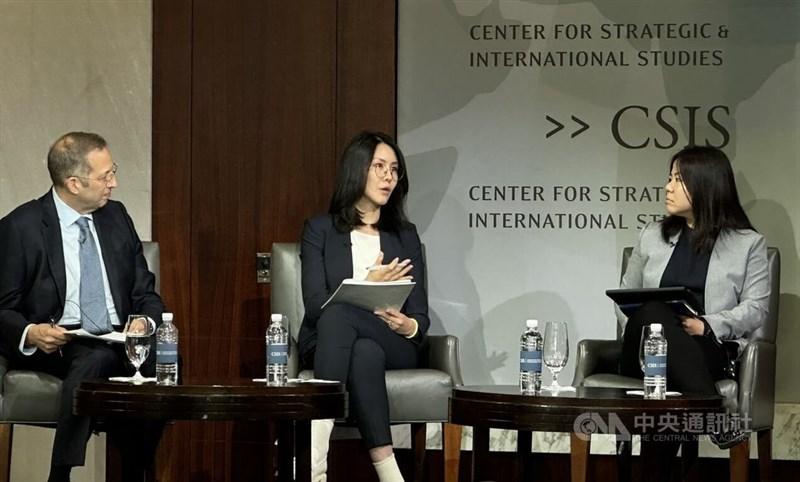An international security expert on Wednesday said that newly elected South Korean President Lee Jae-myung's rhetoric suggests his administration is more likely to pursue economic cooperation with Taiwan than a defense alliance.
Even before his election, Lee said that South Korea would keep its distance if a cross-strait conflict occurred during his term.
Lee is unlikely to commit to a defense partnership with Taiwan, international security expert Eun A Jo said.

Photo: CNA
She was speaking after the "Looking Forward: The Future of United States-Japan-Korea Trilateral Relations" conference held by the Center for Strategic and International Studies and the Korea Foundation in Washington.
As a self-described "pragmatist and realist," Lee defines South Korea's interests differently from the strategic clarity pursued by former South Korean president Yoon Suk-yeol, Jo said.
South Korea is more concerned about potential spillover effects in North Korea and how it might respond in the event of a cross-strait conflict, she said.
Given the threat from North Korea, South Korea might lack the capacity to join a coalition in a Taiwan contingency, Jo said.
"I think these are kind of part of the issues that will end up becoming negotiated in a bundle with the Trump administration," she said. "So there could be a movement, but I don't see the current South Korean administration in particular being interested in any kind of explicit commitment to defend Taiwan during a contingency."
Regarding US President Donald Trump, Jo said the administration in Seoul appears to be considering making US forces in South Korea more "strategically flexible" to respond to potential conflicts beyond the Korean Peninsula.
On potential Taiwan-South Korea cooperation beyond defense, Jo said that both countries share interests in managing Trump's tariffs, regional economic integration and reducing economic dependence on China.
"That's a key shared interest between both South Korea and Taiwanese governments, and I'm sure they're all looking toward diversifying trade partners. So wherever synergies exist, it'll be in economic integration," she said.
Economic partnerships would likely focus on semiconductors, alongside traditional areas such as trade and investment, she added.
"Both are interested in reducing economic dependence on China and exposure to a sort of foreign economic coercion, and also facing a lot of potential hurdles with the Trump administration's ongoing tariff policy," Jo said. "So that's where I see a lot of potential synergy for cooperation."

Alain Robert, known as the "French Spider-Man," praised Alex Honnold as exceptionally well-prepared after the US climber completed a free solo ascent of Taipei 101 yesterday. Robert said Honnold's ascent of the 508m-tall skyscraper in just more than one-and-a-half hours without using safety ropes or equipment was a remarkable achievement. "This is my life," he said in an interview conducted in French, adding that he liked the feeling of being "on the edge of danger." The 63-year-old Frenchman climbed Taipei 101 using ropes in December 2004, taking about four hours to reach the top. On a one-to-10 scale of difficulty, Robert said Taipei 101

A preclearance service to facilitate entry for people traveling to select airports in Japan would be available from Thursday next week to Feb. 25 at Taiwan Taoyuan International Airport, Taoyuan International Airport Corp (TIAC) said on Tuesday. The service was first made available to Taiwanese travelers throughout the winter vacation of 2024 and during the Lunar New Year holiday. In addition to flights to the Japanese cities of Hakodate, Asahikawa, Akita, Sendai, Niigata, Okayama, Takamatsu, Kumamoto and Kagoshima, the service would be available to travelers to Kobe and Oita. The service can be accessed by passengers of 15 flight routes operated by

Taiwanese and US defense groups are collaborating to introduce deployable, semi-autonomous manufacturing systems for drones and components in a boost to the nation’s supply chain resilience. Taiwan’s G-Tech Optroelectronics Corp subsidiary GTOC and the US’ Aerkomm Inc on Friday announced an agreement with fellow US-based Firestorm Lab to adopt the latter’s xCell, a technology featuring 3D printers fitted in 6.1m container units. The systems enable aerial platforms and parts to be produced in high volumes from dispersed nodes capable of rapid redeployment, to minimize the risk of enemy strikes and to meet field requirements, they said. Firestorm chief technology officer Ian Muceus said

MORE FALL: An investigation into one of Xi’s key cronies, part of a broader ‘anti-corruption’ drive, indicates that he might have a deep distrust in the military, an expert said China’s latest military purge underscores systemic risks in its shift from collective leadership to sole rule under Chinese President Xi Jinping (習近平), and could disrupt its chain of command and military capabilities, a national security official said yesterday. If decisionmaking within the Chinese Communist Party has become “irrational” under one-man rule, the Taiwan Strait and the regional situation must be approached with extreme caution, given unforeseen risks, they added. The anonymous official made the remarks as China’s Central Military Commission Vice Chairman Zhang Youxia (張又俠) and Joint Staff Department Chief of Staff Liu Zhenli (劉振立) were reportedly being investigated for suspected “serious